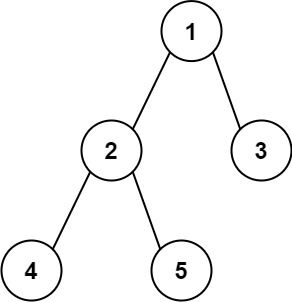Given the root of a binary tree, return the length of the diameter of the tree.
The diameter of a binary tree is the length of the longest path between any two nodes in a tree. This path may or may not pass through the root.
The length of a path between two nodes is represented by the number of edges between them.
Example 1:
Input: root = [1,2,3,4,5] Output: 3 Explanation: 3 is the length of the path [4,2,1,3] or [5,2,1,3].
Example 2:
Input: root = [1,2] Output: 1
Constraints:
- The number of nodes in the tree is in the range
[1, 104]. -100 <= Node.val <= 100
Similar to problem 687. Longest Univalue Path.
# Definition for a binary tree node.
# class TreeNode:
# def __init__(self, val=0, left=None, right=None):
# self.val = val
# self.left = left
# self.right = right
class Solution:
def diameterOfBinaryTree(self, root: TreeNode) -> int:
def dfs(root):
if root is None:
return 0
nonlocal ans
left, right = dfs(root.left), dfs(root.right)
ans = max(ans, left + right)
return 1 + max(left, right)
ans = 0
dfs(root)
return ans# Definition for a binary tree node.
# class TreeNode:
# def __init__(self, val=0, left=None, right=None):
# self.val = val
# self.left = left
# self.right = right
class Solution:
def diameterOfBinaryTree(self, root: TreeNode) -> int:
def build(root):
if root is None:
return
nonlocal d
if root.left:
d[root].add(root.left)
d[root.left].add(root)
if root.right:
d[root].add(root.right)
d[root.right].add(root)
build(root.left)
build(root.right)
def dfs(u, t):
nonlocal ans, vis, d, next
if u in vis:
return
vis.add(u)
if t > ans:
ans = t
next = u
for v in d[u]:
dfs(v, t + 1)
d = defaultdict(set)
ans = 0
next = root
build(root)
vis = set()
dfs(next, 0)
vis.clear()
dfs(next, 0)
return ans/**
* Definition for a binary tree node.
* public class TreeNode {
* int val;
* TreeNode left;
* TreeNode right;
* TreeNode() {}
* TreeNode(int val) { this.val = val; }
* TreeNode(int val, TreeNode left, TreeNode right) {
* this.val = val;
* this.left = left;
* this.right = right;
* }
* }
*/
class Solution {
private int ans;
public int diameterOfBinaryTree(TreeNode root) {
ans = 0;
dfs(root);
return ans;
}
private int dfs(TreeNode root) {
if (root == null) {
return 0;
}
int left = dfs(root.left);
int right = dfs(root.right);
ans = Math.max(ans, left + right);
return 1 + Math.max(left, right);
}
}/**
* Definition for a binary tree node.
* struct TreeNode {
* int val;
* TreeNode *left;
* TreeNode *right;
* TreeNode() : val(0), left(nullptr), right(nullptr) {}
* TreeNode(int x) : val(x), left(nullptr), right(nullptr) {}
* TreeNode(int x, TreeNode *left, TreeNode *right) : val(x), left(left), right(right) {}
* };
*/
class Solution {
public:
int ans;
int diameterOfBinaryTree(TreeNode* root) {
ans = 0;
dfs(root);
return ans;
}
int dfs(TreeNode* root) {
if (!root) return 0;
int left = dfs(root->left);
int right = dfs(root->right);
ans = max(ans, left + right);
return 1 + max(left, right);
}
};/**
* Definition for a binary tree node.
* type TreeNode struct {
* Val int
* Left *TreeNode
* Right *TreeNode
* }
*/
func diameterOfBinaryTree(root *TreeNode) int {
ans := 0
var dfs func(root *TreeNode) int
dfs = func(root *TreeNode) int {
if root == nil {
return 0
}
left, right := dfs(root.Left), dfs(root.Right)
ans = max(ans, left+right)
return 1 + max(left, right)
}
dfs(root)
return ans
}
func max(a, b int) int {
if a > b {
return a
}
return b
}/**
* Definition for a binary tree node.
* struct TreeNode {
* int val;
* struct TreeNode *left;
* struct TreeNode *right;
* };
*/
#define max(a,b) (((a) > (b)) ? (a) : (b))
int dfs(struct TreeNode *root, int *res) {
if (!root) {
return 0;
}
int left = dfs(root->left, res);
int right = dfs(root->right, res);
*res = max(*res, left + right);
return max(left, right) + 1;
}
int diameterOfBinaryTree(struct TreeNode *root) {
int res = 0;
dfs(root, &res);
return res;
}/**
* Definition for a binary tree node.
* class TreeNode {
* val: number
* left: TreeNode | null
* right: TreeNode | null
* constructor(val?: number, left?: TreeNode | null, right?: TreeNode | null) {
* this.val = (val===undefined ? 0 : val)
* this.left = (left===undefined ? null : left)
* this.right = (right===undefined ? null : right)
* }
* }
*/
function diameterOfBinaryTree(root: TreeNode | null): number {
let res = 0;
const dfs = (root: TreeNode | null) => {
if (root == null) {
return 0;
}
const { left, right } = root;
const l = dfs(left);
const r = dfs(right);
res = Math.max(res, l + r);
return Math.max(l, r) + 1;
};
dfs(root);
return res;
}// Definition for a binary tree node.
// #[derive(Debug, PartialEq, Eq)]
// pub struct TreeNode {
// pub val: i32,
// pub left: Option<Rc<RefCell<TreeNode>>>,
// pub right: Option<Rc<RefCell<TreeNode>>>,
// }
//
// impl TreeNode {
// #[inline]
// pub fn new(val: i32) -> Self {
// TreeNode {
// val,
// left: None,
// right: None
// }
// }
// }
use std::rc::Rc;
use std::cell::RefCell;
impl Solution {
fn dfs(root: &Option<Rc<RefCell<TreeNode>>>, res: &mut i32) -> i32 {
if root.is_none() {
return 0;
}
let root = root.as_ref().unwrap().as_ref().borrow();
let left = Self::dfs(&root.left, res);
let right = Self::dfs(&root.right, res);
*res = (*res).max(left + right);
left.max(right) + 1
}
pub fn diameter_of_binary_tree(root: Option<Rc<RefCell<TreeNode>>>) -> i32 {
let mut res = 0;
Self::dfs(&root, &mut res);
res
}
}
